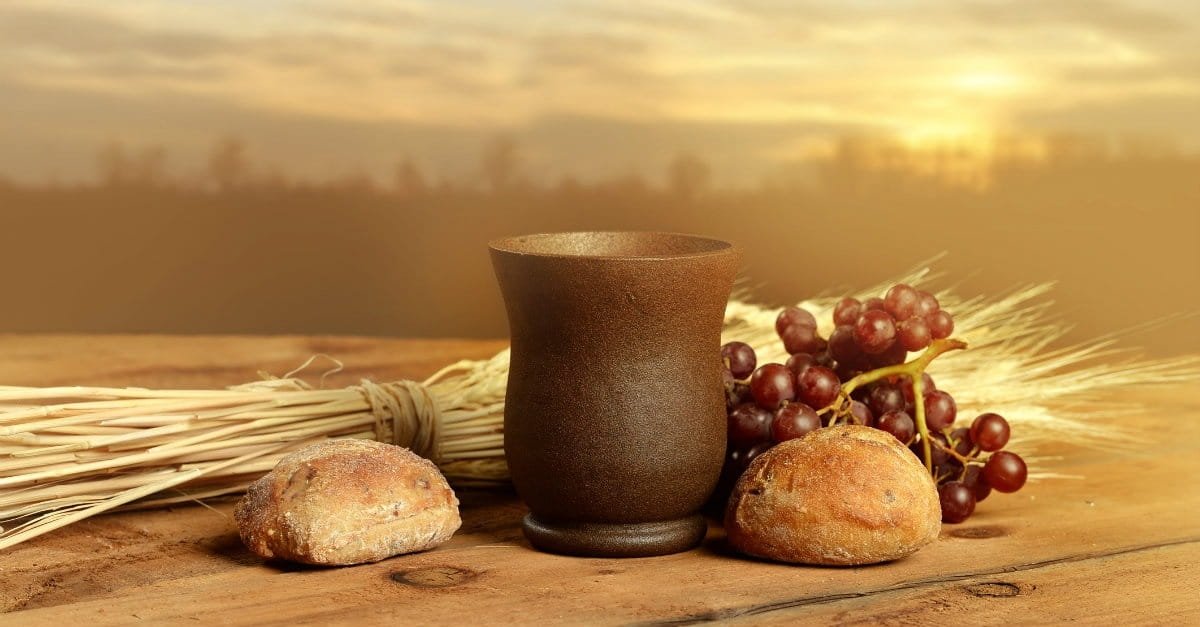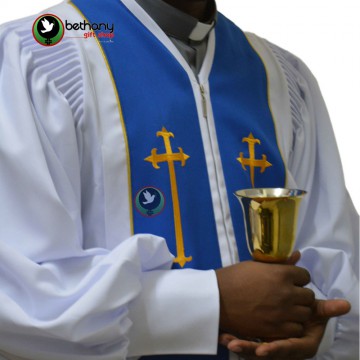
03/12/2019 / By Moses Mwicigi
1 Corinthians 11:25-26 In the same way, after supper he took the cup, saying, “This cup is the new covenant in my blood; do this, whenever you drink it, in remembrance of me. For whenever you eat this bread and drink this cup, you proclaim the Lord’s death until he comes.”
What is the Lord’s Table?
The Lord’s Table is a reminder of what Jesus did in the past, - (Remembarance); a symbol of our present relationship with him- (do this, whenever you drink it), and a promise of what he will do in the future - (For whenever you eat this bread and drink this cup, you proclaim the Lord’s death until he comes.)
The Lord's Table is primarily (but not exclusively) designed to elicit or to stimulate in our hearts remembrance of the person and work of Jesus: “Do this in remembrance of me” (1 Cor. 11:25).
Who instituted the Lord’s Table?
It was Jesus! Luke 22:17-20 “After taking the cup, he gave thanks and said, “Take this and divide it among you. For I tell you I will not drink again from the fruit of the vine until the kingdom of God comes. And he took bread, gave thanks and broke it, and gave it to them, saying, “This is my body given for you; do this in remembrance of me.” In the same way, after the supper he took the cup, saying, “This cup is the new covenant in my blood, which is poured out for you.
Why Should we eat the lords table?
- The Lord’s Table is a remembrance of Our Lord Jesus Christ.
- Lord’s Table remind us of the body of Christ which was offered as a sacrifice for us.
- The cup reminds us the blood which was poured on the cross for our salvation.
- To commemorate the death of Christ: "This do in remembrance of me."
- To signify, seal, and apply to believers all the benefits of the new covenant. In this ordinance Christ ratifies his promises to his people, and they on their part solemnly consecrate themselves to him and to his entire service.
- To be a badge of the Christian profession.
- To indicate and to promote the communion of believers with Christ.
- To represent the mutual communion of believers with each other
Significance of the Lords Table
- “In Him we have redemption through His blood, the forgiveness of sins, according to the riches of His grace.” (Ephesians 1:7)
- The Lord’s Supper is a pledge of forgiveness. Christ comes to you around the table and says, “My body is given for you and my blood is shed for you.” All your wrongdoings are blotted out in the blood of Christ. You are forgiven absolutely and Christ assures you, He will remember your sin no more.
- The Lords Table is a is a feast of remembrance. Christ said, “This do in remembrance of me.” As a believer, you are to keep in mind today and always that Christ became your substitute on Calvary. He died once and for all and because of His death you will live.
- Its a confession of faith. He who partakes in this inspiring Supper confesses Christ before men. As you partake the Lord’s table, you silently declare before the whole congregation, “I believe in Jesus Christ as my Savior and Redeemer.”
- It is a personal remembrance. We are to remember Jesus. The focus isn't on Abraham or Moses or Isaiah. The focus is no longer on the Jewish Passover or the night of his betrayal or anything else. The focus is Jesus. “Do this in remembrance of ME”
- In this remembering we also proclaim the Lord's death till he comes. This, then, is not merely an ordinance that looks to the past. It is an ordinance of hope that points to the future.
The comparisons between the Passover and the Lord’s Table
The reason the Lord instituted the Passover was so that people of Israel would always remember and proclaim their redemption from Egypt:
- This day shall be for you a memorial day, and you shall keep it as a feast to the Lord; throughout your generations, as a statute forever, you shall keep it as a feast. (Exodus 12:14)
- And when you come to the land that the Lord will give you, as he has promised, you shall keep this service. And when your children say to you, ‘What do you mean by this service?’ you shall say, ‘It is the sacrifice of the Lord's Passover, for he passed over the houses of the people of Israel in Egypt, when he struck the Egyptians but spared our houses.’” (Exodus 12:25-27)
The Lord’s Supper was instituted for the same reason:
For I received from the Lord what I also delivered to you, that the Lord Jesus on the night when he was betrayed took bread, and when he had given thanks, he broke it, and said, “This is my body which is for you. Do this in remembrance of me.” In the same way also he took the cup, after supper, saying, “This cup is the new covenant in my blood. Do this, as often as you drink it, in remembrance of me.” For as often as you eat this bread and drink the cup, you proclaim the Lord's death until he comes. (1 Corinthians 11:23-26)
Old Testament Israel looked back to the Exodus through the Passover meal. NT Israel (that's us) looks back to the cross and resurrection of Jesus through the Lord’s Supper.
- Examine Exodus 12 and 1 Corinthians 11. What are the similarities between the Hebrew service of Passover and the Lord's Supper?
- It was at the Jewish Passover Seder (Service) that the Lord's Supper was instituted. In Exodus 12, God commanded the perpetual keeping of the Feast of Unleavened Bread and the Passover.
- Even though later Judaism added extra-biblical traditions and practices, the essential elements of the service were still kept in the time of the New Testament (and are still observed today).
The following is a list of the adaptations from the Passover that is found in the Lord's Supper:
Both services are "permanent" memorials:
"And you shall observe this thing as an ordinance for you and your sons forever" (Exod 12:24) . "This do, as often as you drink it, in remembrance of Me." "For as often as you eat this bread and drink this cup, you proclaim the Lord's death till He comes" (1 Cor 11:25b, 26).
Both services involve bread.
"In the first month, on the fourteenth day of the month at evening, you shall eat unleavened bread, until the twenty-first day of the month at evening" (Exod 12:18). "And as they were eating, Jesus took bread, blessed and broke it, and gave it to the disciples and said, 'Take, eat; this is My body'" (Matt 26:26, and parallels). Our Lord took one of the main elements of the Passover meal and invested it with a new meaning, namely, a direct call to remembrance of Himself. (1)
Both involve blood:
"And they shall take some of the blood and put it on the two door posts and on the lintel of the houses where they eat it" (Exod 12:7).
"For this is My blood of the new covenant, which is shed for many for the remission of sins" (Matt 26:28).
- In one the blood is literal, in the other, the red passover wine (2) is used to stand for blood. Both are tokens of redemption. It may be significant that the blood on the sides and top of the door would form a cross, the instrument of torture on which Christ died.
Both involve communal fellowship:
- There was to be one lamb per household, and if one household was too small it was to meet with the neighbors.
- "So continuing daily with one accord in the temple, and breaking bread from house to house, they ate their food with gladness and simplicity of heart" (Acts 2:46).
- Here is also a noteworthy difference between Passover and Lord's Supper: in the former, a lamb was needed; in the latter, an all-sufficient Lamb for all time (and eternity) obviates any physical lamb. With the Lamb of God in the midst, none other was needed. (Historically, the disciples no doubt had a lamb on the night of "the Last Supper," but the fact that it is not mentioned is significant.)
Both commemorate redemption:
- "And it shall be, when your children say to you, 'What do you mean by this service?' that you shall say, 'It is the Passover sacrifice of the LORD, who passed over the houses of the children of Israel in Egypt when He struck the Egyptians and delivered our households.' So the people bowed their heads and worshipped" (Exod 12:26, 27).
- The Haggadah, or ritual account of the meaning of the Seder, was similar to Christian explanations and devotions based on the meaning of Christ's death. Examples are in 1 Corinthians 5: "Christ our Passover" (v 7) and the "unleavened bread of sincerity and truth" (v 8).
???????Few definations to understand:
The Breaking of Bread
- The earliest and most primitive expression refers to the fact that the Lord's Supper is a meal, though not one at which one is to expect to be filled. (First Corinthians 11:34 says to eat at home if you are hungry!) In several passages in Acts it is not certain if the Lord's Supper, the "love feast" (agape), or an ordinary meal among Christians is meant.
The Communion
- This word represents the Greek for "having things in common, or "sharing" (koinonia). The expression "receive communion" tends to obscure the fact that believers share or commune both with other members and with Christ the Head; they do not "receive" a miraculous element from a priestly "celebrant"!
The Lord's Table
- This phrase reminds us of Psalm 23, of the ancient Near East's well-known code of hospitality, and of being part of God's family. It is the Lord's Table, not our table, and it should be open to the Lord's people (and none other). Exact reception policies of different churches vary, but we believe that local church discipline should keep out those living in known sin (e.g., 1 Corinthians 5) or holding heretical doctrines (e.g., 3 John 9-11).
The Eucharist
- This is the anglicized form of the Greek word for thanksgiving (eucharistia). Many Bible Christians avoid this term because it is usually associated with so-called "high church" bodies. However, if we use it in its original meaning as a giving of thanks for the finished work of Christ, it can add something to our Christian vocabulary.
The Lord's Supper
- Most evangelicals like this term best of all, though it is worth noting that it only occurs once in the New Testament, and then in a negative use. Paul rebukes the Corinthians for their rather carnal observance of the feast of remembrance as not being the Lord's Supper (1 Cor 11:20), but their own!
A Communion Prayer
Lord Jesus, I bow before you in humility and ask You to examine my heart today. Show me anything that is not pleasing to You. Reveal any secret pride, any unconfessed sin, any rebellion or unforgiveness that may be hindering my relationship with You. I know that I am Your beloved child, having received You into my heart and life and having accepted Your death as penalty for my sinfulness. The price You paid covered me for all time, and my desire is to live for You.
As I take the bread representing Your life that was broken for me, I remember and celebrate Your faithfulness to me and to all who will receive You. I can't begin to fathom the agonizing suffering of Your crucifixion. Yet You took that pain for me. You died for me! Thank You, Jesus. Thank You for Your extravagant love and unmerited favor. Thank You that Your death gave me life—abundant life now, and eternal life forever. As You instructed Your disciples, I, too, receive this bread in remembrance of You.
And in the same way, as I take this cup representing Your blood poured out from a splintered cross, I realize that You were the supreme sacrifice for all my sin: past, present, and future. Because of Your blood shed for me, and Your body broken for me, I can be free from the power and penalty of sin. Thank You for Your victory over death. You took the death that I deserved. You took my punishment. Your pain was indeed my gain. And today I remember and celebrate the precious gift of life You gave me through the blood that You spilled.
Each time I take communion, Lord, I want to recommit my life, my heart, my thoughts, my everything to You. Fill me today with Your powerful Spirit. As I leave this place, help me to hold this fresh remembrance and the story that never grows old close to my heart. Help me to share its message faithfully as You give opportunity.
In Your Precious name, amen.
Thank you




